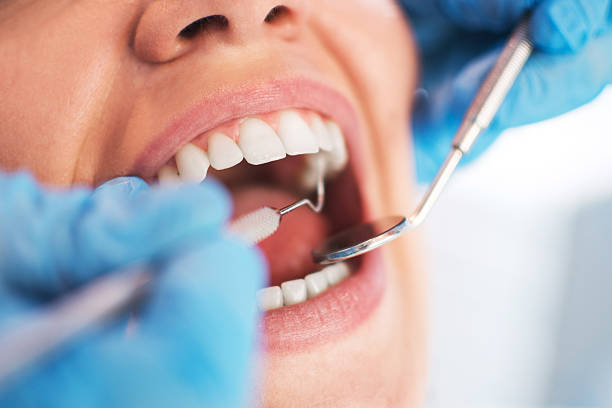If you suspect you might have an infected tooth, fractured tooth, or several teeth experiencing decay, then there is a chance that you might need a tooth extraction.
Dr. Schumer of Elk Grove Village, Il, may determine that you need a tooth extraction for any number of reasons.
In addition to experiencing severe tooth decay or an infection, others who might need a tooth extraction could be experiencing advanced periodontal disease, or have broken teeth that cannot be fully or partially salvaged. Poor tooth position, (such as impacted teeth) might also require an extraction, especially if the patient is being prepared for orthodontic treatment.
Regardless of the reason you might need a tooth extraction, that decision can only be made by an experienced dental professional. At Schumer Family Dental Care in Elk Grove Village, our practice will be able to thoroughly examine and carefully walk you through this important procedure.

Problems Caused By Tooth Extraction
When it is not done carefully by a professional, the removal of a single tooth can lead to problems related to chewing, jaw movement, and teeth alignment, which can have a major impact on your dental health.
For instance, when a tooth is knocked out of a person’s mouth, it leaves the root of that tooth exposed. When properly stored and protected, the loose tooth and socket where it once was can be reunited if you quickly seek emergency dental care.
Without taking the careful steps necessary to protect your tooth and seek professional care, you can experience a painful dry socket, dead tooth, damaged roots, and risk an infection surrounding that area of the mouth. In other instances, when a tooth is barely hanging on and extraction doesn’t seem possible, a professional like Dr. Schumer will discuss alternatives to preserve your oral health. This would also involve replacement options involving crowns, bridges, dental implants, and more.
The Extraction Process
The idea of a tooth extraction does not sound pleasant or easy to most. To ensure you’re feeling as comfortable as possible before and during your extraction, our office staff will do their best to accommodate your physical and emotional needs before the procedure. At the time of extraction, the doctor will need to numb your tooth, jawbone, and gums that surround the area with a local anesthetic.
You will feel a lot of pressure when the extraction has begun, but should not feel any pain as a result of the anesthetic numbing the nerves around your mouth and jaw. The doctor will firmly rock the tooth to widen the socket and remove the tooth from your gum line.
If you do feel pain at any time during the extraction, you must let the staff conduct this procedure right away.
Sectioning A Tooth
In some instances, a tooth will require sectioning during an extraction. This usually occurs because a tooth is firmly anchored in its socket, or the root is curved and the socket can’t expand enough to remove it. To section the tooth off, the doctor carefully divides the tooth into sections, then removes each of them from your mouth.
After Tooth Extraction
After tooth extraction, a blood clot needs to form to stop the bleeding and begin the healing process. You’ll be instructed to bite on a gauze pad for 30 to 45 minutes immediately after the appointment.
If the bleeding or oozing persists after this period, then you’ll need to place another gauze pad and bite firmly for another 30 minutes. You may have to do this several times to staunch the flow of blood.
Once the bleeding stops, you should not disturb or dislodge the clot that has formed in this area. Do not rinse vigorously, suck on straws, smoke, drink alcohol, or brush your teeth next to the extraction site for at least 72 hours.
Otherwise, these activities may hinder the healing process. You should also limit vigorous exercise for the next 24 hours, as this increases blood pressure and may cause more bleeding from the extraction site.
You should also take pain medications as prescribed and expect the swelling to subside after roughly 48 hours.
If antibiotics are also prescribed, continue to take them for the indicated length of time even if signs and symptoms of infection are gone. In addition to taking these precautions, you’ll also need to
- Drink lots of fluids
- Eat nutritious, soft food on the day of the extraction
- Rest and avoid rigorous exercise for one day
- Apply an ice pack to your mouth if you experience swelling or pain
- Resume your normal dental routine after 24 hours.
Following these guidelines will speed up the healing process, and help keep your mouth fresh and clean.
After a few days, you should feel fine and can resume your normal activities. If you have heavy bleeding, severe pain, or continued swelling for more than 2 to 3 days, you should call our office immediately.
To schedule an appointment to have your teeth examined for a potential extraction, please contact Dr. Schumer’s office in Elk Grove Village, Illinois.
